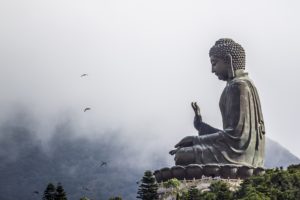
Buddhism is thought to be the world’s second-oldest belief system, but there’s a lot of misinformation in modern culture. Maybe this is because so many people get information from movies and television, but that debate can be saved for another time. About 300 million practice Buddhism, which is thought to be a way of life, not simply a religion. Let’s talk about some of the myths about Buddhism and what is more realistic.
Myth: Nirvana is like heaven.
Buddhanet.net offers this explanation: “The word Nirvana comes from the root meaning ‘to blow out’ and refers to the extinguishing of the fires of greed, hatred and delusion. When these emotional and psychological defilements are destroyed by wisdom, the mind becomes free, radiant and joyful and at death one is no longer subject to rebirth.” To say Nirvana is the same as the Christian heaven is wrong.
Myth: All Buddhists are vegan or vegetarian.
Yes, many Buddhists do not eat meat or use animal products, but to say all Buddhists are vegetarian is like saying all Christians abstain from alcohol. Modern Buddhists may eat meat, provided the animal’s killing is not personally witnessed.
Myth: Buddha was a god, like Jesus.
Siddhartha Gotama was a man who never claimed to be a god. He was born in Nepal, into a royal family, but found that wealth and luxury did not guarantee happiness. After years of exploring the different religions and philosophies of the day, he believed he had been enlightened.
Myth: Buddhism is not a religion.
Yes, Buddhism is a philosophy, but many people, especially Millennials, who want nothing to do with organized religion, claim that Buddhism is not a major religion. Social scientists, historians and census-takers all consider Buddhism to be one of the six religions in today’s society.
Myth: The Four Noble Truths and Eightfold Path are similar to the 10 Commandments.
The 10 Commandments are specific rules to follow to have a fulfilling life, while the Noble Truths are more about the condition of life. The Eightfold Path is a way of approaching life to end suffering and to develop compassion for others.
Myth: Buddhists tend to be more liberal at the polls.
Consider the Christians you know. Do they all vote the same way? Stereotyping Buddhists is just as wrong as stereotyping any other group. Buddhists vote their conscience at the polls, whether liberal, conservative or independent.
Myth: If you visit a temple, you’ll be asked for money and harassed about converting.
In the Buddhist tradition, the teaching of Buddhism is always free. Going to the temple does not cost money; however, if you talk to a master for a long time, it is customary to give a donation out of respect for the attention. Retreats and special events may have a cost, simply due to organizational expenses.
Buddhists do not generally solicit conversions but allow each person to follow his or her own path. In fact, Buddhanet.net recommends, “[D]o not impulsively rush into Buddhism. Take your time, ask questions, consider carefully, and then make your decision. The Buddha was not interested in having large numbers of disciples. He was concerned that people should follow his teachings as a result of a careful investigation and consideration of facts.”
Many Buddhist converts get excited about sharing their religion. This is human nature. If you are not interested, you need to set boundaries. A true friend will respect those boundaries, such as not speaking or inviting you to every meeting. Know your mind. Don’t feel as if you have to explain your own religious convictions, just be firm about what you want. This works with anyone who is trying to impose their beliefs or wishes on you.

